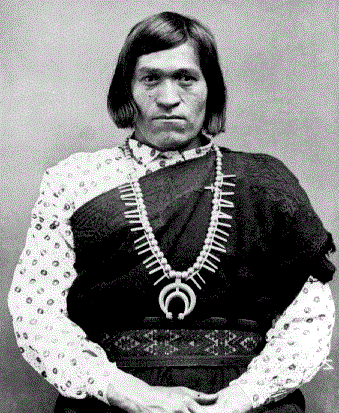We’Wha, Zuni Berdache

( – promoted by navajo)
In 1882 a Washington, D.C. newspaper reported: “Society has had recently a notable addition in the shape of an Indian princess of the Zuni tribe.” While in Washington, We’Wha had an interview with President Grover Cleveland and led a charity ball organized by society women. What the newspaper and Washington social circles failed to notice was that the “princess” We’Wha was a man who wore women’s clothes and took on many of the traditional Zuni women’s roles. While this was something that would have seemed strange to the non-Indians of the time, the berdache (one term for describing this type of individual) was common not only to the Zuni, but to many other tribes.
We’Wha was born in 1849 and like all Zuni became a member of his mother’s clan (donashi:kwe, the Badger People), and had ceremonial ties to his father’s clan (bichi:kwe, the Dogwood People). As a boy he was initiated into the South Kiva (chuba:kew kiwitsine), the kiva of the husband of the midwife who had assisted at his birth. Following this, his spiritual education included the memorization of numerous songs, prayers, myths, and lore of the kachinas. As a teenager, he joined the masked kachina dancers. Initially, he had to borrow a mask, but he later acquired his own.
While We’Wha was receiving male religious education, he was also acquiring women’s vocational skills under the guidance of his female relatives. This included grinding and preparing corn, cooking, housekeeping, gathering firewood, and carrying water (water was carried in large jugs which were balanced on the head). He also acquired skills in pottery and weaving.
We’Wha’s skills as a potter and as a weaver reached non-Indians. He was commissioned to make pots that were destined for the Smithsonian Institution in Washington. With regard to weaving, one American expert on Indian weaving at the time described We’Wha as an expert and her weaving as highly collectible. We’Wha was among the first Zuni to produce pottery and weaving for sale to non-Indians and in this way helped to start a process that would lead to traditional Indian arts being considered fine arts.
In 1879, We’Wha went to work for the Presbyterian mission school at Zuni. The missionaries, assuming We’Wha was female paid him with goods, primarily dresses. Among the Zuni, some people may get jealous of another’s good fortune. If this person who is jealous is a witch, then the person with the good fortune may be attacked spiritually. This happened to We’Wha and as a result he became quite ill. He was treated and cured by a traditional healer and as a result made a vow to join the healer’s medicine society. As a result, We’Wha joined the Bedbug People (Beshatsilo:kwe), a society which treated burns, ulcers, cancers, and parasites. In their public rites, the Bedbug people performed with fire: dowsing themselves with coals and walking barefoot across fire beds.
In 1892, another important event in We’Wha’s life occurred. A few days before the Shalako ceremonies were to begin, Dick Tsanahe, the Pueblo’s governor, received some whiskey. In turn, he gave or sold the whiskey to some young men who had gathered at his house (or rather at his wife’s house as Zuni houses are owned by the women). One of the men, Nick Dumaka, became drunk, obnoxious, and argumentative. The other young men took him outside of the pueblo, beat him with stones and left him for dead. Dumaka, however, did not die and later defiantly taunted his attackers with words that branded him as a witch.
Among the Zuni, witchcraft – the use of spiritual powers to obtain goods, to get revenge, or to obtain sexual favors – was a serious offense. Witches were to be executed, but if they confessed, they were allowed to live in exile. The bow priests, responsible for the prosecution of witches, seized Dumaka and took him to their ceremonial chamber for trial. Dumaka’s father went to the American authorities and asked for help to save his son’s life.
The American authorities arrived and went to the house of Dick Tsanahe with the intention of arresting him for giving whiskey to Dumaka. The officials were met at the door by We’Wha who would not let them come in. According to American accounts, We’Wha physically threw one official out and then closed the door. The door, however, closed on the man’s coattails and he had to use his saber to cut himself free.
The American authorities deployed their troops around the Pueblo, but they were met by angry Zuni who made it clear that they would fight. The Americans retreated and called for reinforcements. Outnumbered, the Zuni asked for peace and the Americans arrested the bow priest Nayuchi and We’Wha. The two were jailed without a trial and without any indication of the authority for their arrests. We’Wha spent more than a month in jail and then was released. It was the middle of winter and he walked more than 40 miles across the continental divide to return home.
When We’Wha lay dying of heart disease in 1896, Nayuchi was summoned to treat him. Nayuchi’s diagnosis was that a witch had shot bits of mutton into We’Wha’s heart. Three times Nayuchi attempted to draw out the foreign mutton, but he failed and We’Wha died.
We’Wha’s body was prepared for burial with bathing and being rubbed with corn meal. A pair of white cotton trousers was then drawn up over the legs. This was the first men’s clothing that he had worn in many years. The body was then dressed in the finest women’s clothing. The body was taken to the grave and then We’Wha’s personal possessions were destroyed.
Since We’Wha was only 49 years old when he died, his death was considered premature. The bow priests later arrested a woman accused of witchcraft and extracted a confession from her. In this way, the matter of We’Wha’s death was laid to rest.
Among the Zuni, We’Wha was ilhamana, what some anthropologists today call a berdache. We’Wha was a man who wore women’s clothing and who filled both male and female roles. As with many tribes, the berdache was recognized as a third gender.



